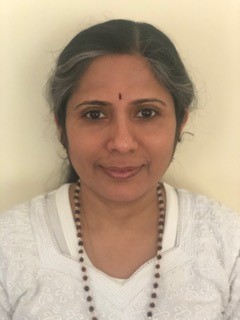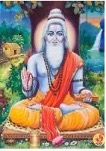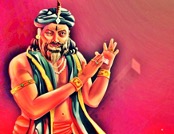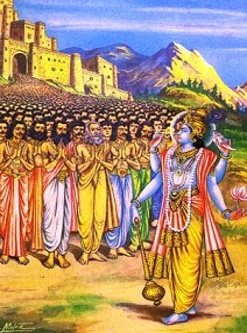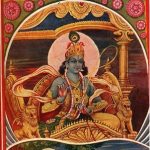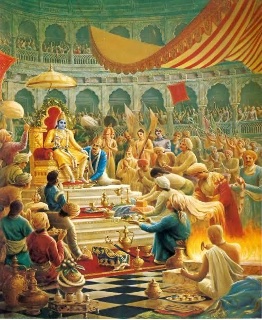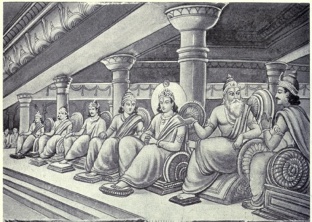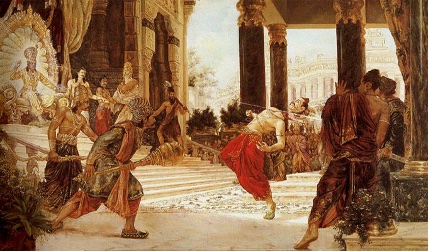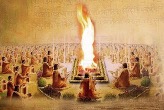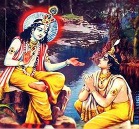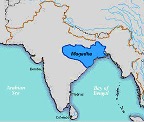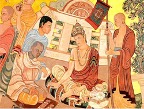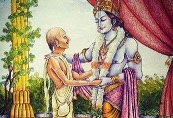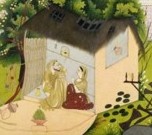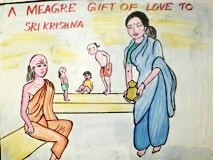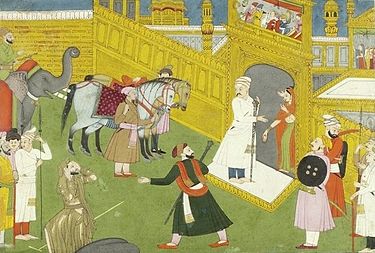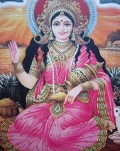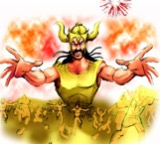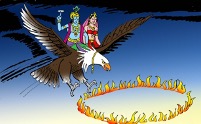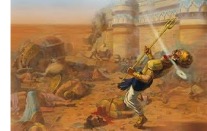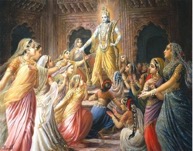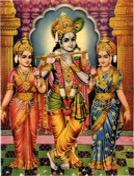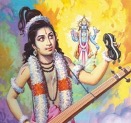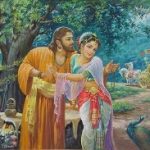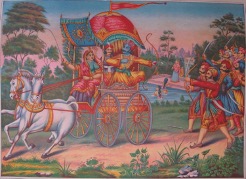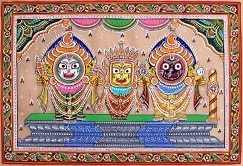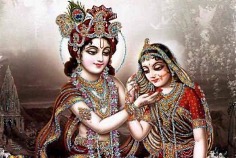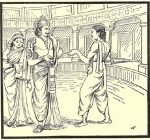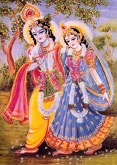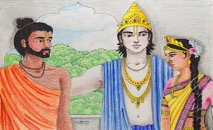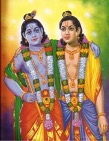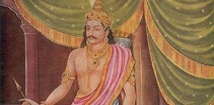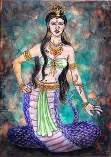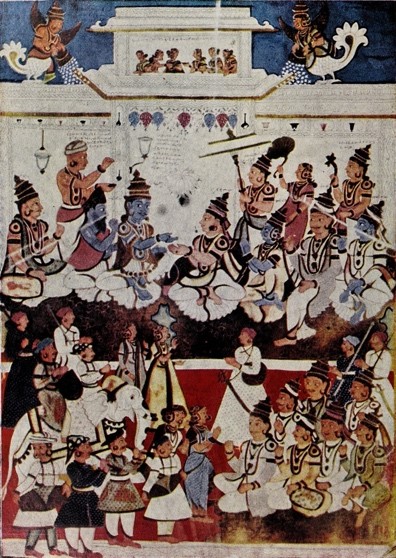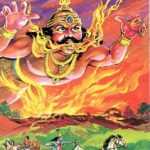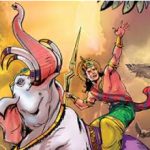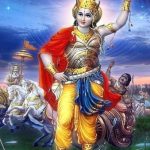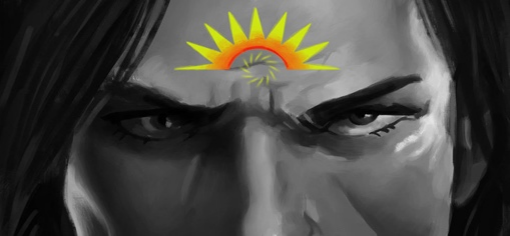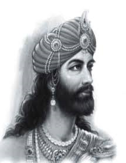By Nirooshitha Sethuram, Yogaratna
Graphics by Sheralee (Shambhavi) Hancherow
Though the killing of Shishupala generated some unpleasant moments, which were skillfully controlled by Krishna, the yaj~na ceremony was completed successfully. Soon after the ceremony, Sage Vyasa came to say goodbye and to bless Yudhishthira. He also advised Yudhishthira that he should be prepared for some unpleasant events and misfortunes soon. Yudhishthira decided that he would always be polite with all his relatives and not give them any cause to become agitated. This decision indeed cost him and his family great sorrow later.
Duryodhana was so mesmerized by the wonders of Yudhishthira’s palace that he decided to stay for few more days with his uncle Shakuni after the yaj~na ceremony was over. He went all over the palace, admiring all its features and envying the prosperity of the Pandavas. He longed to possess all of its glory to himself but didn’t know how it could be accomplished.
Everything about the palace was a divine mystery. Once, while he was walking through the assembly hall built by Mayasura, he bumped his head against a wall thinking it was a door. It was not so bad for there had been no one visible to witness it. But he heard a suspicion of girlish giggle, and the voice was very familiar. It was Draupadi. She happened to be in an overlooking chamber seeing him bump into the wall and giggled.
It didn’t end there. More things happened to fuel the fire in Duryodhana’s heart. Duryodhana’s anger grew more and more out of control with each such experience in the throne room. He saw Yudhishthira sitting on a golden thrown in the hall of illusion, looking like Lord Indra, the King of the Devas, surrounded by Draupadi and his brothers. As the hall was full of illusions, Duryodhana mistook a hard floor for a pool of water, making a fool out of himself walking across the floor with his clothes pulled up to the knees. For this he received a mocking laugh from Draupadi and Bhima as well as chuckles from the others.
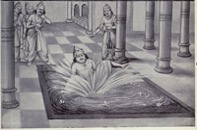
https://sites.google.com/site/
mayaabounds/the-hall-of Duryodhana slips in pool of water
Infuriated by this, he strode forward and fell into a pool which appeared like a beautifully polished floor. Draupadi, unable to control her laughter, tried her best not to laugh again. Bhima with all the other onlookers had a good laugh, much to Duryodhana’s irritation. Yudhishthira, always good natured, could never bear the sight of another’s distress, so he immediately ran to comfort Duryodhana, offering him rich and fancy garments.
Yet, this incident deeply upset Duryodhana, enraging him so much he wanted to take revenge for the insult. Especially Draupadi’s laughter made him swear vengeance on her as well as the Pandavas. These incidents rejuvenated the embitterment in Duryodhana’s heart and mind against the Pandavas. Additionally, his resentment towards the Pandavas was encouraged by his uncle Shakuni.
Feeling greatly insulted, Duryodhana spoke to his uncle, saying that he could no longer tolerate the Pandava’s wellbeing and prosperity. He wanted to wage a war against them, to take away their kingdom and their pride. His cunning uncle Shakuni cautioned him, making it clear that defeating the Pandavas in a war would be nearly an impossible task. But then he told Duryodhana that he had a devious plan to win everything back while taking revenge on Draupadi who insulted him. With doubt written all over his face, Duryodhana exclaimed, “Is it really possible?”
Shakuni pointed out that Yudhishthira’s gambling habit was his true weakness. Shakuni then said he had never lost a single game due to his enchanted dice. He proposed to throw the dice on behalf of Duryodhana, who should simply leave the rest to Shakuni. So, once they returned to Hastinapura from Indraprastha, the plan was for Duryodhana to convince his father to invite the Pandavas for a gambling match. As Duryodhana was sickened to stay any longer, they departed for Hastinapura right away. Duryodhana was ruminating over his ridiculous fall. He couldn’t get the image of Draupadi laughing at his discomfiture out of his head. He could never rest in peace until he made Draupadi a laughingstock in the same way.
Duryodhana had to convince King Dhritarashtra to agree to the scheme. This would not be difficult as Dhritarashtra was weak-willed and so fond of his son that he would do anything for him. He had always ignored all Duryodhana’s mistakes and wrongdoings. At first, he would start advising his son, then he would agree to everything his son fancied.
As soon as Duryodhana returned to Hastinapura, he met his father and described the grandeur of the Pandavas’ palace of illusion, built by Mayasura. He also shared the outrageous experience of how he was insulted by Draupadi and Bhima. Seeing the anger on his father’s face, he knew that was the best time to put forth his plan to take revenge for this insult. He was now very sure his father would agree to the evil plan, due to his troubled emotions.
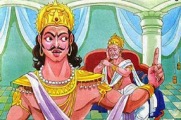
https://srimadmahabharat.blogspot.com/
2018/02/dhritarashtras-approval-to-plan.html
Duryodhana immediately told Dhritarashtra about their plan and easily persuaded him to agree to it. It wasn’t hard because he repeated the taunt of Draupadi in order to fuel the anger. He convinced his father that they would be able to win Indraprastha without war and bloodshed. Dhritarashtra fell for the scheme, thinking they could get back the other half of his kingdom.
Though he was burning under the anguish of Draupadi’s insulting act, Dhritarashtra decided to consult with his brother Vidura, the chief minister. Vidura warned about the consequences, as dishonest acts can sow seeds of conflict and ruin the peace of both sides. But Vidura’s advice was not at all acceptable to Duryodhana.
At last, as always, Dhritarashtra allowed his son to have it his way. He ordered the servants to prepare a hall for a game of dice. He requested Vidura to invite Yudhishthira to compete in the game despite his warnings. Vidura was very unhappy hearing about this, but as the chief minister he had to carry out a royal order.
At Indraprastha, Vidura gave Yudhishthira the royal invitation publicly. Then, at the personal level, Vidura told Yudhishthira that he was very much against the idea of the game. Instead of persuading Yudhishthira to attend the games, Vidura alerted him, explaining the evils of gambling. In this way he urged Yudhishthira not to accept as Vidura knew it was a trick devised by Duryodhana and Shakuni.
While having Vyasa’s warning in his head about the future, Yudhishthira did not wish to make Dhritarashtra unhappy by refusing to attend, so he accepted the invitation. Refusing the invitation might be an insult to King Dhritarashtra. It is very common in royal affairs to invite each other for games, and refusing it is uncommon. But most of all, Yudhishthira’s addition to gambling affected his decision. He didn’t want to let the opportunity slip by. As Vidura couldn’t convince Yudhishthira, who remained firm on his decision, Vidura advised to be on guard at all times.
The Pandavas, along with Draupadi, arrived in Hastinapura. Shakuni and Duryodhana gave a passionate welcome to the Pandavas. The Pandavas were given a magnificent feast. The next day, when they entered the hall built for the dice game, the Pandavas were quite honest about their admiration of the hall. It was crowded with people, friends, relatives and teachers. Amongst them were Grandsire Bhishma, Dronacharya, Kripacharya, ministers and other prominent citizens. Dhritarashtra was sitting on his throne. Yudhishthira was determined to maintain a cordial relationship at all costs.
Shakuni was going to play on behalf of Duryodhana, as they had decided earlier. Shakuni using his own dice would easily defeat the unskilled Yudhishthira. It is said that Shakuni’s father, King Subala, had asked Shakuni to make dice from his backbone after his death, so these dice were full of powerful magic. They would roll the number Shakuni wanted when thrown. So Shakuni would decide what number would be called for each game.
On behalf of the Kauravas, Shakuni spoke to Yudhishthira to set the rules and the stakes for game. Yudhishthira insisted the games should be fair without any room for cheating. Shakuni, knowing the remark was for him, got annoyed and said to Yudhishthira, “Remember this is gambling. The dice decides the winner. So, no room for cheating.” Duryodhana said he would set the stakes while his uncle would roll the dice on his behalf. Yudhishthira at first objected to that arrangement, but later agreed due to sarcastic comments from Shakuni.
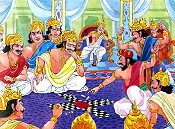
https://sites.google.com/site/storiesofdharmaandkarma/
story-3-the-dice-game
The game began. Yudhishthira would usually start anything by invoking divine blessings but somehow it slipped his mind on this important occasion. The game began and Shakuni rolled his magical dice. Yudhishthira lost the first stake. The trend continued. Yudhishthira lost every stake, one by one. The whole court watched this with pin-drop silence.
After every throw, the Kauravas would shout in triumph. Gradually, Yudhishthira lost all his worldly possessions, his jewelry, elephants, horses, chariots, army, servants, castles and finally his entire kingdom. Shakuni’s cries of triumph and Duryodhana’s victorious howls filled the hall enormously.
No one in the assembly dared to intervene as they were afraid of the Kauravas. Even at that point, it never occurred to Yudhishthira to mentally ask for help, for a divine intervention. It was clear that noble Yudhishthira was under the influence of his senses. The only question was what else could Yudhishthira stake?
More to come…
